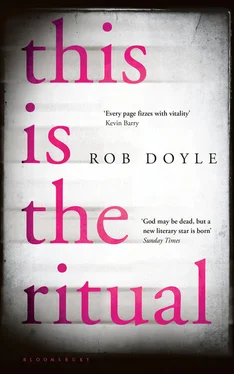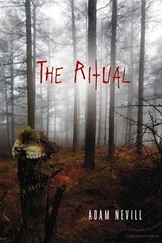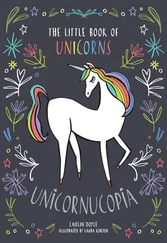Rob Doyle - This is the Ritual
Здесь есть возможность читать онлайн «Rob Doyle - This is the Ritual» весь текст электронной книги совершенно бесплатно (целиком полную версию без сокращений). В некоторых случаях можно слушать аудио, скачать через торрент в формате fb2 и присутствует краткое содержание. Год выпуска: 2016, Издательство: Bloomsbury Publishing, Жанр: Современная проза, на английском языке. Описание произведения, (предисловие) а так же отзывы посетителей доступны на портале библиотеки ЛибКат.
- Название:This is the Ritual
- Автор:
- Издательство:Bloomsbury Publishing
- Жанр:
- Год:2016
- ISBN:нет данных
- Рейтинг книги:5 / 5. Голосов: 1
-
Избранное:Добавить в избранное
- Отзывы:
-
Ваша оценка:
- 100
- 1
- 2
- 3
- 4
- 5
This is the Ritual: краткое содержание, описание и аннотация
Предлагаем к чтению аннотацию, описание, краткое содержание или предисловие (зависит от того, что написал сам автор книги «This is the Ritual»). Если вы не нашли необходимую информацию о книге — напишите в комментариях, мы постараемся отыскать её.
This is the Ritual — читать онлайн бесплатно полную книгу (весь текст) целиком
Ниже представлен текст книги, разбитый по страницам. Система сохранения места последней прочитанной страницы, позволяет с удобством читать онлайн бесплатно книгу «This is the Ritual», без необходимости каждый раз заново искать на чём Вы остановились. Поставьте закладку, и сможете в любой момент перейти на страницу, на которой закончили чтение.
Интервал:
Закладка:
but when i had been crying 4 hours & lost everything i hear a voice. it is d angel she says SON YES IT IS DARK NOW U HAVE SEEN D TRUTH. D GREAT LONELINESS. . THERE IS NO LOVE THERE IS NO HOPE. . CRUELTY HAS WON U MUST ACCEPT THIS. D FATE OF D EARTH IS DECIDED. EARTH IS NOW HELL BUT IT IS STILL POSSIBLE FOR U TO LEAVE D EARTH. U MUST DESTROY D BODY & THEN I WILL TAKE U FAR AWAY IN SPACE. A SMALL BLUE PLANET WHERE D LORD JESUS LIVES IN EXILE. THIS IS ALL WE HAVE LEFT. I AM SORRY 4 EVERYTHING. IT IS NOT 2 LATE. U WILL COME TO ME TOMORROW NIGHT. WE WILL DESTROY D BODY & LEAVE D EARTH I WILL TAKE U FAR AWAY FROM HELL
& then a peace came on me. still on d mountain i was surrounded by devils. but they were silent now. i stood up & walked among them i came down from d mountain i was not crying any more. i said to myself ‘give 2 satan what belongs 2 satan. d world can not be saved. my loved ones & many more will remain in hell. d earth is preparing now 2 become full actual hell this will happen in december 2012. d war 4 d earth has already been lost.’ i was resigned to this
i tell u this because 4 my ma & da & Jennifer it is 2 late. they will be put into Pain Machine & howl 4 billions of years. but d angel told me it is possible 4 u 2 leave d earth in time. rob it is not enough 2 die. u must destroy d body & then b transported . 4 this u will need d angel. first u must accept jesus in yr heart. he is far away & he has failed us but he can help u 2 escape from d coming holocaust
i can not help u any more. i am trying u must listen. time is short. v short. open yr heart. world is Satan but there is new home in deep space & i going there. u will hear no more from me rob. i will pray for u though. i am going 2 meet d angel
Jean-Pierre Passolet, a Reminiscence
When Jean-Pierre Passolet appeared at the door of his flat on a bright February morning in 2010, his loneliness was palpable. Still a thin, fragile-looking man, but with hair whiter than in the photographs, Passolet was living in a dismal council block far from the centre of London — the same flat in which he would be found, two years later, decomposing in his armchair. Driving out there that February day to interview him, taking in the dreary concrete anonymity into which London deteriorates when you cut through the East End, I had thought about some lines from Passolet’s lyric-essay, The Territories :
These peripheral zones, out past the noise, out past the centre, are what death, what oblivion must look like. The high-rises, the rust and ruin, the choked canals and derelict playgrounds — all of it silent, all empty and barren, as though deserted. The people seem barely real. Only a ghost-life, a sketched life, is permitted here. Existence is a waiting room, an antechamber to nothingness. The people understand this, and so it is never spoken about. No one writes out here, and nor should they .
Passolet, I knew, had moved out there because it was all he could afford. His sales had never been great, even during the peak of his acclaim, in the early nineties when Heaven and European Graveyards were published within a year of each other. By the time of my visit he’d long since given up the Hampstead house he’d lived in for several years with Lorraine Holden, his second wife, now divorced. I had gone there on the tube one Saturday afternoon to look at the old house, and to take some pictures. The contrast with his new dwelling was painful. There were even rumours that Passolet was on benefits.
When I turned up to interview him, Passolet was a few months shy of his fifty-eighth birthday. The publishing world had all but left him behind. Attracting few readers now, he had put out his last two books with a very small independent publisher which would never bring him near even the modest fame that had once been his. I was not sure that he cared very much about this; to me, though, this fading of Passolet’s name, this premature obsolescence, was baffling and lamentable. Having first read him, in a trance of fascination, when I was eighteen, I considered Passolet a kind of unsung Sebald or Coetzee, a writer whose work was of a depth, intelligence and sustained, undemonstrative anguish that made him one of the most vital voices in contemporary letters. I hoped that the interview and the article I planned to write might do something to rehabilitate his reputation, and get people talking about him again (I was enjoying, at the time, a relative peak in my own visibility and influence).
Opening the door to his flat on the third floor, Passolet regarded me briefly before offering his hand and saying, ‘Please come in.’ His voice was how I expected it to be — parched, weary, strained, though not unkind — or not, I mused, without ‘an obscene echo of kindness’ (the phrase came to me from European Graveyards ). His accent was glaringly uncorroded, even in those three words. The interior of the flat had a twilight ambience that I sensed was as perpetual as the dust that hung in the air, coating my throat and making me cough as soon as we stepped inside. Passolet led me into a sitting room cluttered with books (most of the titles were in French), printed pages, journals and tax forms.
I heard stirrings from the kitchen. A woman appeared in the doorframe, nodding politely at me before stepping into the hallway and closing the door behind her. ‘My partner,’ said Passolet. She was blonde, attractive, though her eyes were puffy and tired as if she’d been crying — intuitively I glimpsed the bitter fights they must have had, the insults and cruelty that probably made up their days. Perhaps, I thought, the miasma of loneliness pervading the flat was the kind that is heightened, not diminished, by the fact of two people’s proximity. Passolet offered me tea, which I declined. I cleared my throat, feeling a little nervous. He was sitting opposite me, across a low wooden table. ‘Shall we begin?’ I asked. He nodded his head, gaze turned downwards.
I didn’t waste time on what I already knew: Passolet’s excruciating biography, the madness that had pursued him like some black awful wraith, ready to fall on him whenever he weakened. I knew about the psychiatric institutions he had staggered in and out of, an array of them pockmarking first France, then Belgium, and finally Britain. I knew about the ‘rituals with candles and deranged prayers’ he had performed during the nadir of his ordeal. And I knew what loomed behind it all: the sexual abuse he had suffered in his childhood, virtually every day for years, at the hands of his widowed mother’s boyfriend, in the town of Amiens where he grew up. That had gone on till he was thirteen. It was all there, in the books he had written. So too was the teenage alcoholism, and the ‘desperate appeal’ to Catholicism which ended when, at nineteen, he first read Schopenhauer. He would describe this last event in European Graveyards :
I turned the pages in a kind of ecstasy or annihilation. . The houses, the roads and buildings of that drab provincial town, and all the humans and institutions, and everything else fell away, as did the illusion that had sustained them, and I saw that I was falling, like everything else, falling through a limitless void, in slow-motion, without adhesion, the roar of an immense cosmic violence in my ears. But rather than terror, for the first time I felt blessed, liberated, relieved of the weight that had been crushing me all my life .
After this powerful encounter, Passolet gave up drinking and moved to Paris, where he began studying theatre in the Conservatoire National. Initially imagining he would become an actor, he lost interest in the idea after a few years and dropped out, but not before having made many friends in the Parisian avant-garde of the mid-seventies. ‘People liked me because I wasn’t there,’ he later wrote. ‘At least, not as a threat or a rival, which is how most men are condemned to confront one another. I was agreeable because I never felt I had the right to judge or despise anyone.’ Despite his popularity, Passolet was still afflicted with depression and anxiety throughout these years, and was institutionalised several times. Somehow he managed to keep this fact, and the worst upheavals of his nervous condition, from his friends.
Читать дальшеИнтервал:
Закладка:
Похожие книги на «This is the Ritual»
Представляем Вашему вниманию похожие книги на «This is the Ritual» списком для выбора. Мы отобрали схожую по названию и смыслу литературу в надежде предоставить читателям больше вариантов отыскать новые, интересные, ещё непрочитанные произведения.
Обсуждение, отзывы о книге «This is the Ritual» и просто собственные мнения читателей. Оставьте ваши комментарии, напишите, что Вы думаете о произведении, его смысле или главных героях. Укажите что конкретно понравилось, а что нет, и почему Вы так считаете.












